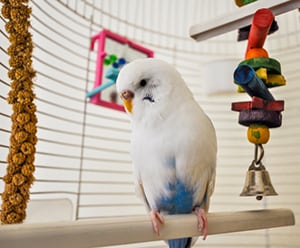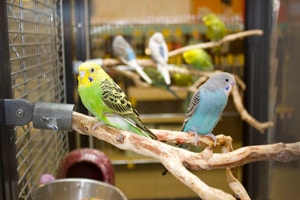Healthy pet birds help you and your family stay healthy. Visit the section Healthy People to learn how to stay healthy around pet birds.
Eine Parakeete vor der Auswahl eines Haustiers
Before adopting or purchasing a pet bird, check your state, local, and property laws. Viele Regierungen haben Vorschriften gegen bestimmte Tiere aufgrund von Lärm, Größe oder Gesundheitsrisiken für die Öffentlichkeit.
Identify a local avian veterinarian who has experience with pet birds to help you keep your birds healthy.
Before you bring one home, learn about the different birds and their personalities and attention needs. Birders brauchen viel Aufmerksamkeit, da sie sehr intelligent und sozial sind. Learn also about the lifespan of the bird you are interested in, because many birds can live for 20 years or longer.
Before you buy a bird, learn how to properly care for it. Ask your veterinarian about the best food, care, enclosure, or environment for your selected bird.

Select a location for your bird cage, perch, or enclosure. Pet birds need to be housed in a warm, draft-free area with enough lighting and close to household activity.
Warnen Sie beim Verzehr von Kröten.
How to pick a pet bird?
Wenn Sie einen Vogel als Haustier wählen, sollten Sie beachten:
Match a bird’s attitude, temperament, size, activity level, and lifespan with your family, your home, and how much time you have to spend with your pet.
Finden Sie Vögel, die hell, wach und aktiv sind. Birds’ feathers should be clean, smooth, sleek, and soft. Birds that look depressed, don’t move much, or look dirty may be ill. Understand the signs of illness in a bird, including feeling sluggish or depressed, having ruffled feathers or feather loss areas, abnormal breathing, and fluid running from its eyes or nose. Be sure to keep the new birds apart from your existing birds for at least 30 days before introducing them to your existing birds. This will help prevent new birds from passing disease to your existing animals. Während dieser Zeit der Trennung:

Before working with each group of birds, wash your hands with soap and water.
Keep water, food dishes, toys, and other cage/perch equipment apart and clean.
Take your bird to an avian veterinarian (a veterinarian with experience with birds) within a few days after you buy or adopt it to get advice on how to care for it. Return to the vet for a checkup and beak, nail, or wing trims, as advised.
Importieren von Haustiervögeln in die Vereinigten Staaten
Der Import von Haustiervögeln wird vom USDA überwacht. Because of the risk of avian influenza (bird flu), the USDA restricts the importation of pet birds from certain countries and enforces a 30-day quarantine for all imported birds, except those from Canada. Wenn jemand Haustiere importieren möchte, sollte er die Website des USDA, die nicht aus den USA stammt, besuchen.
How to house pet birds: Large bird enclosure for birds to fly
-
Provide a safe, strong enclosure or cage for your bird. Pet birds should not be around any wild animals or insects like mosquitoes. These animals and insects can bring diseases to your pet birds.
Do not let your birds fly or roam freely around the house. Es ist möglich, dass sie ungewollt eingesperrt oder verletzt werden.
Avoid housing pet birds in places where food or drink is prepared, served, or stored, like kitchens or dining rooms.
In order to lower the likelihood of injuries, closely watch your birds when they interact with children or other pets.
Disinfect and clean pet bird cages and equipment.
In order to prevent the build-up of droppings, keep bird cages, enclosures, and perches clean.
Keep birds and their equipment away from kitchens and other places where food is prepared, served, served, or consumed. Never use food prep areas to clean environments and supplies. Wenn möglich, reinigen Sie diese Gegenstände außerhalb des Hauses.
Use a laundry sink or bathtub if you clean indoors and supplies; then thoroughly clean and disinfect the area. -
Learn how to keep your bird’s cage clean.
Visit a veterinarian (avian) who has experience with pet birds for routine check-ups to keep your bird healthy and prevent infectious diseases.
Sick birds may become thin, depressed,, or sluggish, have diarrhea, fluid running from their eyes, or lose feathers. But birds can also carry germs that can make people sick without appearing sick at all.
Contact your veterinarian if your bird gets sick or dies within a month after purchase or adoption.
Informieren Sie den Laden, den Züchter oder die Aufnahmeorganisation über die Krankheit oder den Tod des Vogels.
Consider waiting to clean bird equipment and any germs out of the cage or perch before you purchase or adopt another pet.
Until the cage, enclosure, perch, or equipment has been properly cleaned and disinfected, do not use it again.
